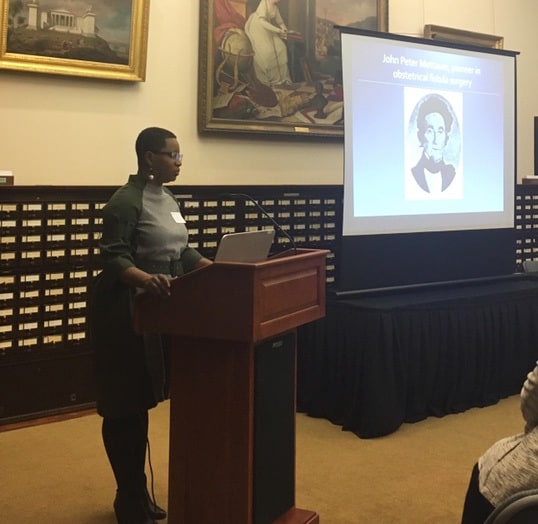Medical Bondage: Race, Gender, and the Origins of American Gynecology
The Program in African American History at the Library Company of Philadelphia would like to thank Dr. Deirdre Cooper Owens for her excellent lecture on her book Medical Bondage: Race, Gender, and the Origins of American Gynecology. The book focuses broadly on the history of slavery in the United States and its relation with medicine, but is centered on the enslaved women’s experience as medical patients, dealing with child labor, and other gender-specific health issues. It wasn’t until recently that scholars began to research the effects that medicine, healing, motherhood, and childbirth had on the impact of enslaved women’s reproductive lives. Throughout her talk, Dr. Cooper Owens stressed the significant role black enslaved women and other immigrants, such as the Irish played on the advancements of American gynecology during the antebellum period. If it was not for the courage of thousands of enslaved women and the struggle they had to endure with so many gynecological diseases, where would the advancement of modern American gynecology be today?
Dr. Cooper Owens digs deeper and examines the theory around the idea of enslaved women being “medical superbodies.” The theory “medical superbodies” represents the experience of an enslaved woman as not only a medical subject but also a representative body. During this time, black enslaved women were seen differently than white women in the medical field. Having been one of the most vulnerable groups, they were seen as being stronger and being able to endure more pain which wasn’t necessarily true. The theory also represents the black woman being treated as objects for the benefits of white medical doctors to examine, operate, treat, and record their findings in medical journals that didn’t always represent the enslaved accurately.
Dr. Cooper Owens’ lecture was very informative in that it provided detailed experiences of specific medical events such as the first time anesthesia was given in a delivery, a list of different medical schools where many southern men attended, and a brief description of prominent southern doctors whose work helped transform American gynecology.
Jasmine Smith
African American History Specialist and Reference Librarian



